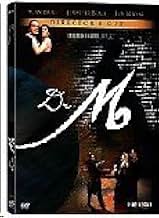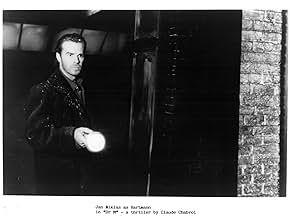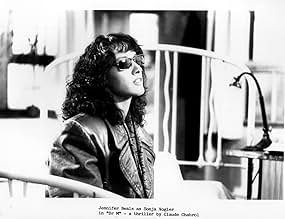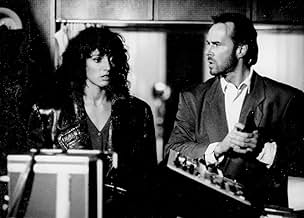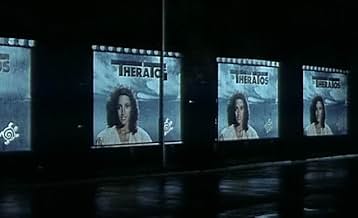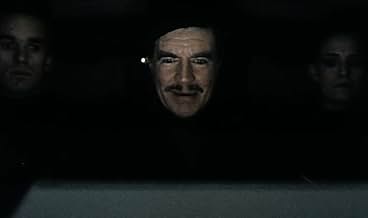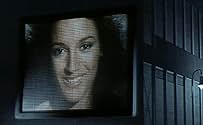Ajouter une intrigue dans votre langueInvestigating a series of suicides, police detective reveals a sinister plot.Investigating a series of suicides, police detective reveals a sinister plot.Investigating a series of suicides, police detective reveals a sinister plot.
Avis en vedette
I quite liked this movie, and intend to watch it a few more times in order to peel off a few more of the layers of meaning Chabrol has woven together. I think most people would find the movie incomprehensible if they didn't know that this is a quasi-remake of Fritz Lang's 1922 masterpiece, "Dr. Mabuse, The Gambler". The "Dr. M" of the title is Chabrol's way of indicating that we are once again in the presence of the bad doctor - not just *a* villain, but THE villain, the ultimate bad guy, genius and madman. Marsfeldt/Mabuse is a pure nihilist in this outing; he's not trying to conquer the world, but to destroy it. His total contempt for humanity drives him to eradicate life wherever he can; he doesn't even bother with Hitler's excuse that he's clearing away the deadwood to make way for a master race. Marsfeldt wants nothing but death and destruction for their own sake. As usual, the plans of the criminal mastermind are disrupted by emotion - in this case, Marsfeldt's weakness for his adopted daughter, Sonja, which prevents him from eliminating her when she becomes a danger to his plans. Alan Bates plays the avuncular father-figure with a compelling creepiness; on the surface he's kind and concerned, but you can't help noticing that every time he touches her, his fingers seem to sink into her flesh like claws, and he kisses her with far too much intensity, leading Sonja to slightly shrink away every time he approaches her. His performance is the best, but Benoît Régent is also good as the high-strung Stieglitz, trapped in a job that's killing his soul, yet unable to disappoint his friend and partner Hartman by leaving. In the end, everyone is guilty to some extent, and only by acting and refusing to yield to despair are Sonja and Claus able to thwart Marsfeldt's plan.
To begin with, I vividly recall reading the mixed newspaper review of this one when it was surprisingly released locally; needless to say, I missed it at the time and, until earlier this year, never again did I have the opportunity to check it out. In fact, it turned up – alas, dubbed – on late-night Italian TV and, though I did record it, I recently opted to acquire the English-language version
which is just as well, since two deleted scenes were included in the package! Anyway, knowing the flak the film has received (which was practically universal), I really did not know what to expect from it. However, I must say that I liked it quite a bit, while acknowledging it cannot hold a candle to any of Fritz Lang's movies revolving around the influential figure of criminal mastermind Dr. Mabuse (here, the name has even been changed to Marsfeldt!). Incidentally, the actor most identified with the role (in a revival series of 1960s low-budget efforts) i.e. Wolfgang Preiss appears here as the Chief Of Police!
Perhaps the film does at times feel like one of the many German TV cop shows which have flooded the market from the 1970s and still continue to this day, but there is no denying the grip of the narrative (which tried, but unfortunately failed, to be prophetic when the Berlin Wall got torn down only months before the picture debuted!). Equally striking is the imagery pertaining to mass suicide (the most disturbing being a child waiter in full view of the patrons at a swank and busy restaurant), media manipulation and wasted disco-crazy youth (appropriately bleak though, I concede, not all that original).
The intense performances are also a plus: particularly Alan Bates as the outwardly charming but obviously sinister Dr. M and Jan Niklas as the disenchanted yet dogged cop on his trail of terror, though heroine Jennifer Beals proves no mere purveyor of eye candy either. Indeed, Bates' occasional resort to hamminess (especially when he passes himself off as a psychedelic guru at a desert holiday resort and spouting his nihilistic credo to an incredulous, disgusted Beals and Niklas during the climax – set in the Doctor's obligatory 'control room' – all the while connected to a life-support system!) are perfectly in keeping with the fanciful goings-on. The eclectic cast also includes the likes of Euro-Cult regular William Berger, future Italian TV presenter Daniela Poggi and former "Brat Pack"-er Andrew McCarthy in small roles.
In the end, while it may fall short of Chabrol's best work, the film nonetheless makes for a thought-provoking, stylized and yet entertaining parable on our less-than-reassuring times (incidentally, its suggestion/fear of the millennium as the 'end of days' is pretty amusing at this juncture).
Perhaps the film does at times feel like one of the many German TV cop shows which have flooded the market from the 1970s and still continue to this day, but there is no denying the grip of the narrative (which tried, but unfortunately failed, to be prophetic when the Berlin Wall got torn down only months before the picture debuted!). Equally striking is the imagery pertaining to mass suicide (the most disturbing being a child waiter in full view of the patrons at a swank and busy restaurant), media manipulation and wasted disco-crazy youth (appropriately bleak though, I concede, not all that original).
The intense performances are also a plus: particularly Alan Bates as the outwardly charming but obviously sinister Dr. M and Jan Niklas as the disenchanted yet dogged cop on his trail of terror, though heroine Jennifer Beals proves no mere purveyor of eye candy either. Indeed, Bates' occasional resort to hamminess (especially when he passes himself off as a psychedelic guru at a desert holiday resort and spouting his nihilistic credo to an incredulous, disgusted Beals and Niklas during the climax – set in the Doctor's obligatory 'control room' – all the while connected to a life-support system!) are perfectly in keeping with the fanciful goings-on. The eclectic cast also includes the likes of Euro-Cult regular William Berger, future Italian TV presenter Daniela Poggi and former "Brat Pack"-er Andrew McCarthy in small roles.
In the end, while it may fall short of Chabrol's best work, the film nonetheless makes for a thought-provoking, stylized and yet entertaining parable on our less-than-reassuring times (incidentally, its suggestion/fear of the millennium as the 'end of days' is pretty amusing at this juncture).
10bensan9
The only negative I can come up with on this is that it is kind of slow. I felt the cheapness just adds to the charm. Should be watched on VHS for best effect.
The actors are good all across the board. Jennifer Beals is a beauty. The mood is depressive and dark with nice music. The location and feel of the architecture and settings are so very cool. Kind of a state controlled European feel going on. The story is interesting and thoughtful. I thought the scenes all fit together in a great way with the sounds and such making this one really great. The repetition of seeing screens of Beals face talking about time all through the film makes it a very trippy, cool film.
I will be watching this one over and over. Awesome film!
The actors are good all across the board. Jennifer Beals is a beauty. The mood is depressive and dark with nice music. The location and feel of the architecture and settings are so very cool. Kind of a state controlled European feel going on. The story is interesting and thoughtful. I thought the scenes all fit together in a great way with the sounds and such making this one really great. The repetition of seeing screens of Beals face talking about time all through the film makes it a very trippy, cool film.
I will be watching this one over and over. Awesome film!
I'm still scratching my head over this one. A "forgotten" flick, filmed in 1989, Club Extinction (or Dr. M on video) has lots of atmosphere courtesy of French director Chabrol, but the choppy editing and mystifying plot exposition leaves the viewer exasperated and more than a little confused. It seems that the people of Berlin are committing suicide at an alarming rate and no one seems to know why. A Big Brother-style multimedia conglomerate and a Jim Jones-ish vacation spa figure into the muddled events.
Meant as a condemnation of the audacious power of the media, this boondoggling film fails on most counts- however, it is certainly odd enough to keep one watching. Alan Bates plays the media messiah, the lovelier than lovely Jennifer Beals is his adopted daughter, and Jan Niklas plays the detective and Beals' love interest. I don't know if any one of them to this day understand what the heck this was all about, but perhaps they can look up Andrew McCarthy for feedback. He was smart enough to show up for about 53 seconds worth of screen time and then very wisely disappear.
Summing up- fans of odd B sci-fi may actually find something of interest here. Problem is, I'm one of those fans, and I didn't. Oh well, choose your poison. Two generous stars (out of five) on the Corkymeter.
Meant as a condemnation of the audacious power of the media, this boondoggling film fails on most counts- however, it is certainly odd enough to keep one watching. Alan Bates plays the media messiah, the lovelier than lovely Jennifer Beals is his adopted daughter, and Jan Niklas plays the detective and Beals' love interest. I don't know if any one of them to this day understand what the heck this was all about, but perhaps they can look up Andrew McCarthy for feedback. He was smart enough to show up for about 53 seconds worth of screen time and then very wisely disappear.
Summing up- fans of odd B sci-fi may actually find something of interest here. Problem is, I'm one of those fans, and I didn't. Oh well, choose your poison. Two generous stars (out of five) on the Corkymeter.
There is a massive wave of suicide in Berlin, some of them causing accidents with hundreds of casualties on both sides of Berlin. The population believes it is caused by a virus and there is an exodus of Berliners that travel through Club Theratos, an agency promoted by the model Sonja Vogler (Jennifer Beals) in several screened billboards, television and magazines. In West Berlin, Lt. Klaus Hartman (Jan Niklas), who lost his wife Nina two years ago after committing suicide, and his partner Sgt. Stieglitz (Benoît Régent) are relentless in the investigation. He believes that the suicides are murders indeed. When the snoopy journalist from Eastern Berlin, Moser (Hanns Zischler), breaks in the Club Theratos, he finds that the owner Heinrich Marsfeldt (Alan Bates) is the responsible for the deaths, and is using his stepdaughter Sonja to hypnotize the population. Further, he intends to use the popular show of the host Veidt (Peter Fitz) to induce the viewers to commit suicide. Will Hartman and Sonja be capable of stopping his evil plan?
"Dr. M" (1990) is a different movie by Claude Chabrol with a futuristic view of Berlin, the same way Jean-Luc Goddard made "Alphavile" in 1965 meaning a different genre from these two filmmakers. The plot is confused, and it is never clear whether Dr. Marsfeldt is only lunatic or has the interest to increase business in his travel agency. But why the police officer is helping him? In the end, this film seems better when watched for the second time, although totally different from Chabrol's style. My vote is six.
Title (Brazil): "Dr. M - Dr. Mabuse e Seu Destino" ("Dr. M - Dr. Mabuse and His Fate")
"Dr. M" (1990) is a different movie by Claude Chabrol with a futuristic view of Berlin, the same way Jean-Luc Goddard made "Alphavile" in 1965 meaning a different genre from these two filmmakers. The plot is confused, and it is never clear whether Dr. Marsfeldt is only lunatic or has the interest to increase business in his travel agency. But why the police officer is helping him? In the end, this film seems better when watched for the second time, although totally different from Chabrol's style. My vote is six.
Title (Brazil): "Dr. M - Dr. Mabuse e Seu Destino" ("Dr. M - Dr. Mabuse and His Fate")
Le saviez-vous
- AnecdotesAlthough director Claude Chabrol was famous for his extreme admiration for Alfred Hitchcock, who is frequently referenced in Chabrol films, he eventually came to believe that Fritz Lang was an even more important film-maker, once telling an interviewer that "without Lang, there would be no Hitchcock". This film was designed specifically as an elaborate tribute to Lang and was released in 1990, the centenary year of Lang's birth.
- ConnexionsFollowed by Doctor Mabuse (2013)
Meilleurs choix
Connectez-vous pour évaluer et surveiller les recommandations personnalisées
- How long is Dr. M?Propulsé par Alexa
Détails
- Durée1 heure 56 minutes
- Couleur
- Mixage
- Rapport de forme
- 1.66 : 1
Contribuer à cette page
Suggérer une modification ou ajouter du contenu manquant

